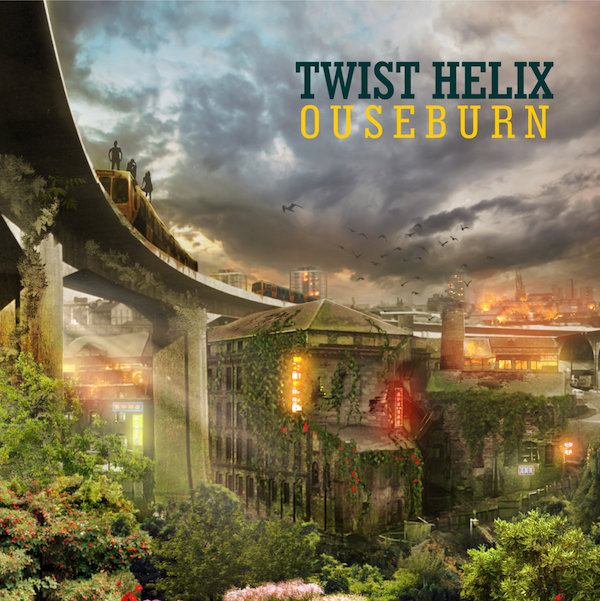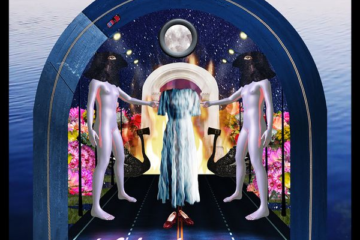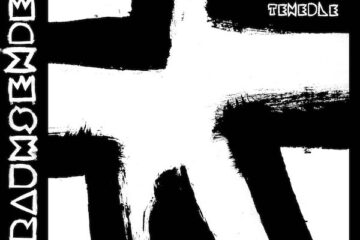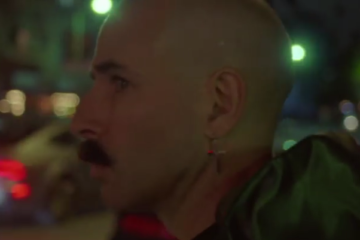“This city’s not sleeping/it’s dreaming.”
If there’s a line that sums up the new Twist Helix album, it’s the above one on opening track ‘Newcastle’. Although much of the alt-electro outfit’s material deals with the decline of communities and the threats to grassroots music scenes, there’s always a hint of optimism.
Consisting of Bea Garcia (vocals & keyboards), Matthew Barron (bass) and James Walker (drums), Twist Helix had already clocked up one album (2016’s Manifesto) in their burgeoning musical journey. But with the arrival of their latest opus Ouseburn, the band have stepped up a gear with a tighter, more dynamic sound. It’s also marked by songs that delve deeply into the troubles that afflict music communities, but in particular the Ouseburn area of Newcastle.
As James Walker remarked in an interview with TEC previously: “Losing venues hurts our city, its artists and everyone invested in its scene. The real catalyst was a series of closures of art spaces that started around 2016. One of the most noticeable losses in Newcastle was the closure of a community-ran venue called the Star & Shadow Cinema; the S&S was an amazing space, cinema, political bookstore… you name it, it had everything.”
These themes also had a visual interpretation, care of artist Trevor Storey, whose haunting illustrations often revealed a dystopian version of Newcastle. These images, which graced the sleeves of Twist Helix’s singles (and feature on the album sleeve art), had a post-apocalyptic theme which usually feature the band members gazing on scenes of decay and desolation.
Yet, despite the troubling narrative that’s threaded throughout the music of Twist Helix, their music has a surprisingly upbeat, euphoric element to it. There’s similarities to the power pop of Chvrches, although Twist Helix manage to pull off social commentary better than the Scottish trio (whose ‘Graves’ was a slightly awkward attempt at political messaging). The band have previously cited influences that include M83 and Depeche Mode, although Twist Helix’s strident tunes stand some distance away from the sound of Basildon’s finest.
Instead, Ouseburn does a remarkable job at sounding contemporary – and also relevant. With the decline of music venues and the changing face of the music industry itself, it’s refreshing to see a band tackle these issues, but at the same time pull off some very polished pop tunes in the process.
Twist Helix’s use of instrumentation also gives the band a sturdy foundation. Walker’s drumming is straight from the Stephen Morris school of percussion and there’s a generous nod to the sound of Joy Division lurking behind a lot of Ouseburn’s material. That gothic element is emboldened by Matthew Barron’s bass and it’s nice to see guitar work utilised to great effect on tunes with a heavy electronic direction (the slightly odd fundamentalism that’s been creeping into electronic music fandom, in which drums and guitars are considered beyond reproach, is a worthy dogma to push back on). Meanwhile, Bea Garcia’s striking vocals and keyboard talents soar above this impressive foundation to deliver Twist Helix’s signature sound.
Ouseburn opens with the plaintive piano melodies that signal the aforementioned ‘Newcastle’. As a track, it acts as an overture for the album as a whole, building up to a clarion call for hope.
On ‘The Artists’, Garcia muses on the contrasts between a nightlife of “dull crowds” to find “where the artists go to feed their souls”. It’s a more downbeat number against the rest of the material on Ouseburn, but it still has a lively percussive drive to it.
Arguably, the album’s title track represents the best example of Twist Helix dialled up to 11. ‘Ouseburn’ is a solid electropop number that breathes tight melodies and euphoric lifts. It’s a remarkable contrast against the lyrical content, focussing on the decline of Newcastle’s shipbuilding culture (“The changing industry/burying memories of Swan Hunter”) and the vibrant musical scene that’s springing up in the same areas (“creative energies fuelling melodies below Byker”).
BUY NOW
‘Graphite’, one of the last tracks to emerge prior to the album’s release, equally has a visceral quality and a lyrical focus on the frustrations of creating art. Garcia’s vocals take on a desperate energy here. It’s typical of how Twist Helix approach music composition, as Garcia explained to TEC previously: “We’re friends who make a big joyous, uptempo racket. We smile when we play, and we don’t ever shy away or dial things down. We just play big bold songs we love.”
It’s not often that you see songs inspired by structural engineers, but ‘Ove Arup’ offers one of those oddly inspired tunes that OMD usually excel at. The Newcastle-born Arup is considered to be one of the foremost engineers of his generation in a career that includes the iconic Sydney Opera House. Twist Helix turn this unlikely theme into a journey of sorts (“it’s all connected”) for a tightly composed power pop outing that results in one of the album’s finest moments.
One of the album’s early heralds, ‘Pulse’ offers a dramatic tour de force of driving percussion and soaring vocals. Similarly, ‘Little Buildings’ (which we favourably reviewed back in 2017) similarly has an oddly joyous energy that’s at odds with a strident lyrical narrative that deals with themes of gentrification (“Come and see them ripping out its heart/Rush to see, to see it fall apart”).
Ouseburn has apparently been a torturous exercise to get over the finishing line, but the end result is a superb album of soaring pop tunes that also have a heart and a message lurking within the infectious melodies. If you’ve yet to experience the joys of Twist Helix, then Ouseburn offers the finest example of one of the UK’s emerging talents.
Ouseburn is out now on Paul Back Music.
Twist Helix are performing live on 31st October at The White Bear, Barnsley, 2nd November at Vault in Leicester and 3rd November at Queen St Brewhouse in Colchester.
https://www.twisthelix.com/
https://www.facebook.com/twisthelix
https://twisthelix.bandcamp.com/










